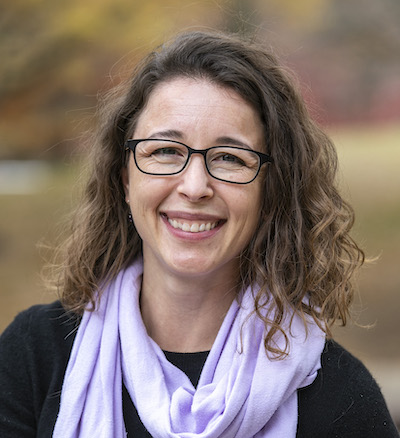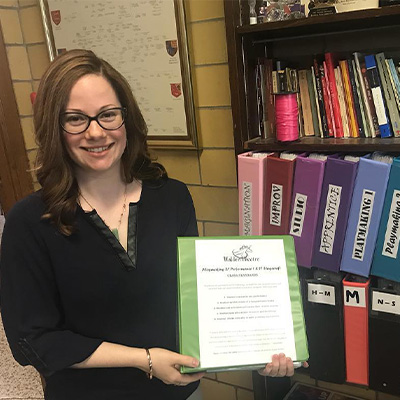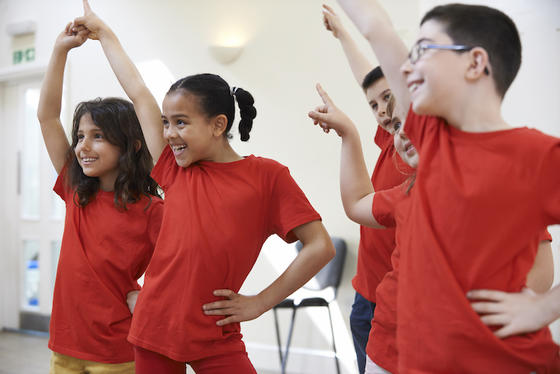When Thalia Goldstein studies children in theater, she looks at the skills they’ve gained not only in acting, but in life. She’s aiming to help them develop a heightened sense of empathy as a result of the bonding and teamwork they experience during various theater exercises and activities.
Goldstein, an associate professor of applied developmental psychology at George Mason University, studies how participating in theater helps children to develop essential life skills and better communicate with others.

“The great thing about psychology is you can use the tools and techniques to study basically anything, and I use them to study acting, theater, play and imagination,” said Goldstein, who has been studying the topic for her entire career.
Theater teachers rate students on social-emotional skills such as communication, creativity, teamwork, initiative, and problem solving, at the beginning and end of each semester, which Goldstein and her research partners then take into consideration to see what effect theater has had on different aspects of their personalities.
For the last six years, this longitudinal study has followed more than 1,000 theater students ages 5-18, and looking at the effects of formal theater activities on their social and emotional skills.
Goldstein co-directs the Mason Arts Research Center, a National Endowment for the Arts lab. When she spoke at the 2018 Arts Education Partnership Annual Convening where she met future colleague Julane Havens, who had already collected years' worth of research from her previous position at the Commonwealth Theatre Center (CTC) in Louisville, Kentucky.
“I didn't want all those binders of data to just sit there and collect dust,” said Havens, the Associate Director of Learning at Shakespeare Theatre Company in DC. “It was just good luck or fate that Thalia was there that day and that I was also moving to the Washington, D.C. area.”

Working with Goldstein and Havens is Megan Stutesman, a fourth-year PhD student and graduate research assistant in Mason’s Psychology Department.
“I came to Mason to study under Thalia,” said Stutesman. “In the early stages, I took on the role of cataloging, organizing, and getting these hard copy files into a digital format. I had a really good working knowledge of what the data looked like and what we could potentially do more scientifically and psychologically with it.”
Havens said that assessment tools built at CTC helped the students by scheduling 15-minute ‘end of semester conversations’ with students at the advanced level—typically teenagers with a couple years or more experience.
For example, “a 15-year-old, hard-working, and naturally gifted student, who was regularly cast in leading roles, was often overly critical of his work and relied heavily on feedback from his teachers,” said Havens. “On the rubric under creativity, we could point to ‘Student can describe their artistic choices and progress, but often relies on the opinions of others to be sure of their work’ and discuss with this student ways he could work on progressing to ‘Student gives carefully considered reasons for their choices, and progresses without the approval of others.’”
The goal is for the student to develop his own definition of success, so he can continue working without constant reassurance. “It was a privilege to witness this student's confidence grow. By the time he was a senior in high school, he was a leader in class who frequently uplifted and supported the younger students.”

The students work with complex plays, scripts, and characters, said Goldstein, who teaches a class in psychology of creativity and innovation.
“Theater has a sense of containment that means students are free to do all sorts of things they might not feel comfortable doing in the real world,” said Goldstein.
For example, within the confines of a practice space, a group of three students might be asked to improvise a scene where they are waiting at a bus stop, which allows them to not only rely on one another throughout the exercise, but get to know one another and the way their peers are thinking.
“The arts are a potential place for children to better themselves, and in particular, to better the things that they may not be getting in a traditional academic classroom,” said Stutesman. “Theater and other performing arts are a space where kids can practice and utilize those skills and therefore develop those skills.”
“You see them connecting with folks in a different way. They’re off of the phones, off of the computers,” said Havens. “My hopes and dreams for this work as we continue it results in more resources and support for theater and theater teachers.”
Related News
- November 10, 2025
- June 26, 2025
- July 22, 2024
- July 10, 2024
- August 14, 2023
